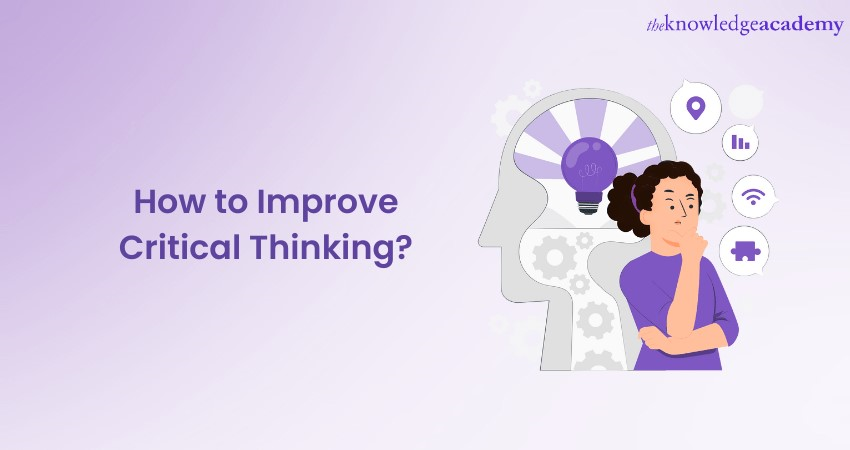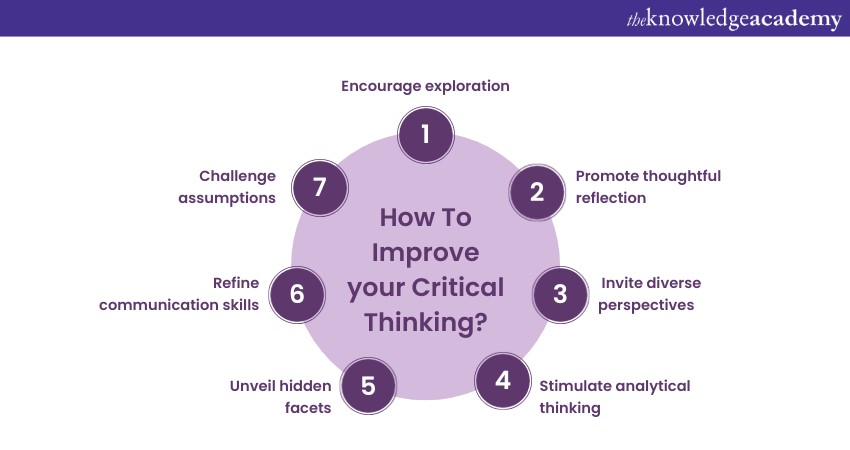We may not have the course you’re looking for. If you enquire or give us a call on 01344203999 and speak to our training experts, we may still be able to help with your training requirements.
Training Outcomes Within Your Budget!
We ensure quality, budget-alignment, and timely delivery by our expert instructors.

Critical Thinking Skills are important for intellectual growth and effective decision-making. Critical Thinking involves objectively evaluating information, questioning assumptions, and considering diverse viewpoints. To enhance these skills, it is crucial to cultivate a curious mindset that actively seeks deeper understanding.
Embracing complexity and acknowledging the nuance of issues encourages a more comprehensive approach to problem-solving. In this blog, you will learn How to Improve Your Critical Thinking and its significance in improving intellectual capabilities.
Table of Contents
1) The significance of Critical Thinking
2) How to Improve Critical Thinking?
a) Increase self-awareness
b) Comprehend your cognitive processes
c) Cultivate predictive abilities
d) Engage in active listening
e) Find good sources for information by yourself
f) Ask lots of questions that don't have one-word answers
g) Avoid relying on social media for news consumption
h) Develop the ability to identify false or misleading news
i) Challenge your personal biases
j) Dedicate yourself to enhancing your Critical Thinking abilities
k) Make up your mind after thinking about things carefully
3) Conclusion
The Significance of Critical Thinking
Critical Thinking is essential to make informed decisions and maintain intellectual autonomy. It empowers individuals to dissect information, discern biases, and navigate complex thoughts and problems. In professional settings, it underpins problem-solving and innovation.
Socially, Critical Thinking fosters empathy and respectful discourse, bridging diverse perspectives. Cultivating this skill enhances one's ability to adapt to a diverse world. It helps boost a mindset that values evidence, logic, and open-mindedness.

How to Improve Critical Thinking?
Here are some points which will help you to understand how you can improve your Critical Thinking abilities:
Increase self-awareness
Elevating Critical Thinking involves a crucial component: self-awareness. Understanding your biases, assumptions, and cognitive processes can enhance your ability to approach information objectively. Introspection allows you to recognise and mitigate personal prejudices, fostering a more impartial data analysis.
Additionally, heightened self-awareness enables you to acknowledge gaps in your knowledge, prompting a continuous pursuit of learning. This proactive engagement enables you to make more informed decisions, thus embracing a holistic perspective that goes beyond personal biases. In essence, cultivating self-awareness is a foundational step towards refining Critical Thinking skills and adopting a more discerning approach to the complexities of information.
Comprehend your cognitive processes
Understanding your own cognitive processes is crucial in sharpening your Critical Thinking skills. It involves introspection into how you perceive, interpret, and analyse information. Understanding the mechanisms behind your decision-making process allows for identifying potential biases and assumptions.
Diving into cognitive processes involves recognising patterns of thought, embracing uncertainty, and refining logical reasoning. By understanding your cognitive functions and processes, you can empower yourself to approach challenges with a more objective and adaptive mindset.
Cultivate predictive abilities
Cultivating predictive abilities is integral to advancing Critical Thinking. It involves anticipating potential outcomes based on available information and recognising patterns. By honing this skill, you can proactively assess the consequences of decisions, inculcating strategic thinking. Predictive abilities require analytical thinking and foresight, encouraging consideration of long-term implications.
Embracing this aspect of Critical Thinking enhances problem-solving by anticipating challenges, fostering adaptability, and promoting a more comprehensive understanding of dynamics between various factors. Ultimately, predictive abilities enable you to navigate complex situations with improved foresight and strategic insight.
Engage in active listening
Active listening is the cornerstone of refining Critical Thinking skills. It involves fully immersing oneself in the speaker's message, not merely hearing but comprehending the nuances. By attentively absorbing information, one gains a deeper understanding of diverse perspectives, allowing for more informed analysis. This practice enhances empathy and promotes open-mindedness, which is a vital component of unbiased reasoning.
Active listening also aids in identifying underlying assumptions and questioning preconceptions, contributing to a more nuanced and well-rounded interpretation of information. By cultivating this skill, you can foster a collaborative exchange of ideas, enriching your cognitive toolkit and ultimately strengthening your ability to evaluate and respond to complex situations critically.
Do you want to improve relationships, boost productivity, and elevate your personal development journey? Sign up now for our Active Listening Skills Training!
Find good sources for information by yourself
Independently seeking reliable sources is fundamental for Critical Thinking skills. It entails proactively pursuing diverse, reputable information to form a well-rounded understanding. By verifying sources, individuals can discern credibility, sift through biases, and ensure the accuracy of the data.
This skill fortifies one's knowledge base and fosters a discerning approach to taking in information. It promotes autonomy, empowering individuals to navigate the vast sea of data with a keen eye for quality and reliability. In an era of abundant information, identifying trustworthy sources is a linchpin for making informed and reasoned decisions.
Ask lots of questions that don't have one-word answers

Pose open-ended questions to deepen Critical Thinking. Inquiring beyond a simple yes or no response encourages exploration, fostering a more comprehensive understanding. Such questions prompt thoughtful reflection and invite diverse perspectives, promoting a healthy exchange of ideas. By understanding the complexities of a subject, individuals stimulate analytical thinking and uncover hidden facets.
This practice not only refines communication skills but also challenges assumptions and encourages a holistic examination of information. Embracing the art of asking open-ended questions cultivates a mindset that values curiosity and actively explores nuanced topics, contributing significantly to the development of robust Critical Thinking abilities.
Avoid relying on social media for news consumption
It would help if you steered clear of relying solely on social media for news consumption to enhance Critical Thinking. Social platforms often prioritise sensationalism, leading to the spread of misinformation. Diversify information sources by consulting reputable news outlets, scholarly articles, and varied perspectives. By doing so, you develop a more comprehensive understanding of issues and mitigate the influence of biased narratives.
Social media's algorithmic nature creates echo chambers, limiting exposure to diverse viewpoints. Breaking away from this echo chamber enables a more objective evaluation of facts, nurturing a critical mindset that values accuracy and depth over the potentially misleading snippets in social media feeds.
Learn how to unlock efficiency and elevate your personal and professional success with our Time Management Training!
Develop the ability to identify false or misleading news
Cultivate the skill to filter out false or misleading news, a crucial aspect of refining Critical Thinking. Scrutinise information sources, fact-check details, and cross-verify with reputable outlets. Understand misinformation tactics, such as sensationalism or selective use of facts. Sharpen your awareness of logical fallacies and biases that might distort the narrative. Developing this ability involves a vigilant approach to news consumption, empowering you to sift through the noise, identify manipulative content, and make informed judgments.
Challenge your personal biases
Actively challenging personal biases is crucial for effective Critical Thinking. Engage in introspection to identify and acknowledge inherent prejudices. Regularly question assumptions and question whether preconceived notions impact your perspectives. Exposure to diverse viewpoints and experiences is crucial for broadening understanding and mitigating bias.
Embrace discomfort as a catalyst for growth, fostering an open-minded approach to information. You can cultivate a more impartial and objective mindset by dismantling cognitive biases, which is essential for objective analysis. This continuous self-examination fortifies Critical Thinking skills and contributes to a more inclusive and empathetic engagement with the world's complexities.
Dedicate yourself to enhancing your Critical Thinking abilities
Commit to continually enhancing Critical Thinking abilities by embracing a proactive approach. Dedicate time to engage with diverse perspectives, cultivate a curious mindset, and regularly challenge assumptions. Actively seek out complex problems, honing analytical skills through thoughtful problem-solving. Prioritise lifelong learning to stay informed and adapt to evolving information landscapes.
Foster self-awareness by recognising personal biases and refining decision-making processes. This dedication involves a commitment to intellectual growth, where each challenge becomes an opportunity to refine and expand Critical Thinking skills.
Make up your mind after thinking about things carefully
Independently formulating opinions is essential for refining Critical Thinking. Deliberately assess information, consider various viewpoints, and evaluate evidence. Resist succumbing to societal pressures or the influence of popular opinions. Cultivate the ability to sift through complexities, weigh pros and cons, and draw reasoned conclusions.
This self-directed approach encourages autonomy and a deeper understanding of issues beyond surface-level information. By making informed decisions based on careful contemplation, individuals strengthen their capacity for discernment and contribute to a more thoughtful and intellectually engaged discourse.
Do you want to elevate customer satisfaction and your career? Register now with our Exceptional Customer Service Training!
Conclusion
We hope you understand How to Improve your Critical Thinking skills and how to refine your Thinking skills. These involve questioning assumptions, seeking diverse perspectives, and independently assessing information. It requires self-awareness, active listening, and a commitment to continuous learning, which will help you to cultivate a critical mindset.
Learn how to navigate challenging discussions confidently with our Managing Difficult Conversations Training!
Frequently Asked Questions
Upcoming Business Skills Resources Batches & Dates
Date
 Supervisor Training
Supervisor Training
Fri 14th Feb 2025
Fri 11th Apr 2025
Fri 13th Jun 2025
Fri 8th Aug 2025
Fri 10th Oct 2025
Fri 12th Dec 2025







 Top Rated Course
Top Rated Course


 If you wish to make any changes to your course, please
If you wish to make any changes to your course, please


